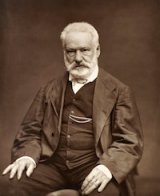Analysis of Morning
Victor Hugo 1802 (Besançon) – 1885 (Paris)
Morning glances hither,
Now the shade is past;
Dream and fog fly thither
Where Night goes at last;
Open eyes and roses
As the darkness closes;
And the sound that grows is
Nature walking fast.
Murmuring all and singing,
Hark! the news is stirred,
Roof and creepers clinging,
Smoke and nest of bird;
Winds to oak-trees bear it,
Streams and fountains hear it,
Every breath and spirit
As a voice is heard.
All takes up its story,
Child resumes his play,
Hearth its ruddy glory,
Lute its lifted lay.
Wild or out of senses,
Through the world immense is
Sound as each commences
Schemes of yesterday.
| Scheme | ABABCCCB DEDEFFXE GHGHCCXH |
|---|---|
| Poetic Form | |
| Metre | 101010 10111 10111 11111 101010 101010 001111 10101 1001010 10111 10110 10111 111111 101011 1001010 10111 111110 10111 111010 11101 111110 101011 111010 1110 |
| Closest metre | Iambic trimeter |
| Characters | 661 |
| Words | 106 |
| Sentences | 5 |
| Stanzas | 3 |
| Stanza Lengths | 8, 8, 8 |
| Lines Amount | 24 |
| Letters per line (avg) | 19 |
| Words per line (avg) | 4 |
| Letters per stanza (avg) | 156 |
| Words per stanza (avg) | 35 |
Font size:
Citation
Use the citation below to add this poem analysis to your bibliography:
Style:MLAChicagoAPA
"Morning" Poetry.com. STANDS4 LLC, 2024. Web. 30 Apr. 2024. <https://www.poetry.com/poem-analysis/54332/morning>.


Discuss this Victor Hugo poem analysis with the community:
Report Comment
We're doing our best to make sure our content is useful, accurate and safe.
If by any chance you spot an inappropriate comment while navigating through our website please use this form to let us know, and we'll take care of it shortly.
Attachment
You need to be logged in to favorite.
Log In